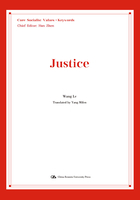
I. What is justice?
Justice is fairness and rightfulness. Different people have different opinions on justice like the saying goes, “The benevolent see benevolence and the wise see wisdom. ”A Western scholar once suggested, “Justice has a Protean face, (is)capable of change, readily assuming different shapes, and endowed with highly variable features. When we look deeply into this face, trying to unravel the secrets hidden behind its outward appearance, bewilderment is apt to befall us. ”
Related Link
Proteus, an early sea god in the Greek myths, was one of the“ocean elderly”called by Homer. The name might mean“the very beginning”, because“protogonos”means“first born”in Greek. He had the ability to predict the future, and often changed his shapes so as to not be caught. He might change into a lion, a snake, a leopard, a pig, even a tree or running water, and only predicted the future for those who caught him.
On the issue of justice, there are conflicts of different concepts and meanings, and more importantly, conflicts of social interests behind it. Due to different stances and angles, people understand social justice differently. For example, at the end of 2012, on the issue of“non-local students entering senior high schools and sitting college entrance exams locally”, parents of students from other places and those from Beijing had a discussion on the Internet. One side held that only by eliminating discrimination and allowing children, who migrated with their parents, to have an equal opportunity to take the college entrance examination as the local children can justice be demonstrated. The other side held it to be unfair if the household residence restrictions were loosened, because that, as held by them, would affect local children's opportunities.
The concept of justice emerged in men's practice of material production, so its concrete contents always reflect the economic structure and system under certain historical conditions. At different stages of social development, groups of people with different interests struggle and compromise, and justice is people's recognition of the rules and institutions formed to handle and regulate different social relations.
As for what justice is in a specific society, different interest groups in different societies have different answers. The Romans and Greeks believed slavery to be just; the capitalist class wanted to abolish the feudal society which was said to be unjust; while the proletariats believed that the capitalist justice was hypocritical, so it requested to abolish the system of exploitation of men by men and achieve people's mastership of the country and the distribution according to work.
Although different classes in different societies understand justice differently, justice, in the most general sense, refers to balanced and reasonable social relations and the standards to be followed in order to achieve such balanced and reasonable social relations. In other words, justice refers to the appropriateness and proportionality of the relationship between men and that between men and the society. Justice means that what one pays and is provided for is“appropriate”to what he/she should pay or be provided for, that is, everyone who participates in social cooperation should undertake his/her responsibilities and be provided with the interests he/she deserves. If someone undertakes fewer responsibilities or gets more than what he/she deserves, people would think it unjust.
In China, the word“justice”, first appeared in Hsun Tzu, is a concept similar to rightfulness, fairness, impartiality and selflessness. Xu Shen, a Chinese scholar in the Eastern Han Dynasty, mentioned in his book Shuo Wen Jie Zi that“公”in“公平(justice)”meant equal distribution; “正”meant integral and impartial. Many Chinese words like“大公无私”, “铁面无私”and“奉公守法”all express the same meaning.
In the Western tradition, “rightfulness”usually means the just order or people and objects in the society; “fairness”refers more to people's selfless and impartial attitude or way of doing things. In reality, the three concepts of justice, fairness and rightfulness are interchangeable. Only in the domain of public life can rightfulness become a topic. Justice better reflects the public nature of rightfulness. Fairness is the combination of two words, namely“public domain”and“equality”. Equality is the basis of protecting social fairness and rightfulness. It always means some kind of equality which is fundamental and principled like equal rights, equal opportunities and equality of all before the law. When each and every member can equally enjoy the rights they are entitled to, and get what they deserve equally, the society would be fair and rightful.
Further Reading
At the press conference held on March 18,2008, Premier Wen Jiabao said, “Equity and justice mean that we need to respect everyone and protect the lawful rights and interests of all. We need to ensure that everyone has an opportunity to pursue all-round development in an environment of freedom and fairness. Just as promoting economic development and increasing people's welfare is the bounden duty of the government, advancing social equity and justice is the conscience of the government. ”